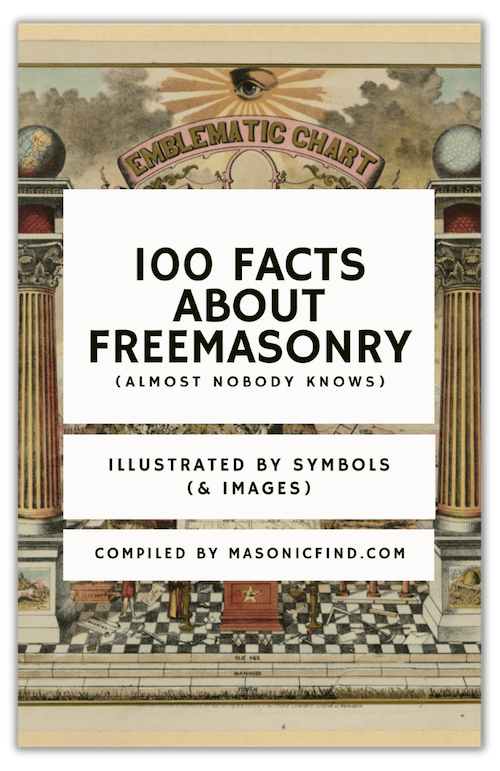Most of the ritual that we perform as Masons is done by memory.
I have never heard of any legitimate grand lodge jurisdiction that allows its members to open their ciphered ritual books while in attendance at a tyled meeting.
What is the best way to memorize the Masonic ritual?
Every person is different and therefore will not be able to memorize in the same ways.
Below are common memorization tips and methods that I have seen in action.
- Find a Quiet Place
- Get a Coach or Mentor
- Rote Memorization
- Learn Your Ritual Backwards
- Sing It
- The Roman Room
- Go Back to Privacy

My Experience With The Ritual
When I first became a Mason, I received compliments from my lodge brethren for how quickly I had memorized ritual pieces.
My secret? I had a coach who taught it to me in the privacy and quiet of his home.
I practiced when working my four ten-hour shifts during the week in a 1.2 million-square-foot (or 365,760 square-meter) warehouse.
About twenty to thirty minutes of each shift was spent near any of my co-workers. For the rest of the time, I was alone and operating loud equipment, fully free to whisper my assigned pieces of ritual under my breath without the worry of being overheard.
That was the perfect job for a new Mason to have.
Find a Quiet Place
Whatever method you decide to employ, it is essential that you be able to concentrate when absorbing the material to be memorized.
The fewer distractions one has, the easier it will be to commit the ritual to memory.
You might lead a hectic life and not have much quiet time for yourself. I have found that it’s quite easy, however, to make time.
Whether this means getting up a half-hour earlier or just going over your ritual book while parked in your truck, there is always a way.
Get a Coach or Mentor
The members of your lodge have been or will be where you are now.
Ask one of your brethren for some help with parts of the ritual.
Coordinate with your mentor a time to meet with him in private, whether at your home, at his home, at the lodge building, or any other place where you will not be disturbed and where your ritual will not be overheard by non-Masons.
It has been my experience that Masons are more than willing to help when they are able.
Rote Memorization
For me personally, it is easiest just to read the ritual over and over again. I will go paragraph by paragraph. If the paragraph is too big, I will split it into parts; if it’s too small, I’ll consolidate it with the next.
Some Masons may only be able to do a few sentences at a time; others might be gifted with an eidetic memory.
Once I have memorized the first portion with which I am comfortable, I will focus on the second. Once I have committed the second roughly to memory, I will start reciting both the first and second.
I will then work on a third, add the third to the combination, and so on. I continue this until I have reached the end of my part, at which point I will simply recite the whole thing verbatim.
Learn Your Ritual Backwards
My newly elected Worshipful Master employs this technique. It is essentially the same as the previous method, except in reverse.
Given the common occurrence of starting out one’s part strong only to struggle at the very end, the reason given for this technique is that, by memorizing the end of your ritual first, you will be far more likely to give your part a strong end, which is far more memorable to your audience than a struggled beginning.
I have personally tried this method a few times and indeed achieved the desired result. However, I typically have enough time to employ the first method above.

Sing It
I have met a few Masons who were able to deliver the ritual without missing a beat. They confided in me that they put the words of their lines to the tunes of their favorite songs.
I’ve tried this one, but have never had any luck. Perhaps I need things to rhyme in order to feel comfortable singing them. But if it works for those Masons, then that’s all that really matters in this regard.
The Roman Room
The concept of the Roman Room (also known as the memory palace) is an ancient one.
For this, I will quote from the book “Solomon’s Memory Palace: A Freemason’s Guide to the Ancient Art of Memoria Verborum” (which I highly recommend, even if you do not decide to pursue this method of study):
Imagine that you are in a room. Any room. In your home, for example. Just choose a room at random. Got it? Okay, now imagine there is a giant, bloodshot eye painted on one of the walls.
That’s weird, huh? Why the heck would anyone paint a giant, bloodshot eye on your wall?
Now, picture yourself walking from that room to an adjacent room
Imagine that in the adjacent room there is a metal can. Any kind of can. A paint can, or a can of beans. It can be on the floor, or on a piece of furniture, or dangling from the ceiling by a piece of string. Whatever you want.
Easy, right?
So, in one room, you have a giant bloodshot eye, and in the next room, you have a can. Go back to the room with the eye painted on the wall, and say aloud what you see. “Eye.”
Now mentally “walk” to the next room and say aloud what you see there. “Can.”
Eye – Can.
Or, in plain English, “I can.”
There you go. You just created a memory palace.
For longer pieces of ritual (like the 15-minute-long lectures that some degree ceremonies have), this can become a tedious process; you create a symbol whose name sounds like your word (or an amalgamation of symbols representing multiple words for sentences; the freakier it is, the more memorable it will be) and you mentally string them in an order about a place that you know well.
Ancient orators from Rome used this method.
Few find a use for it today given the common availability of paper or the convenience of teleprompters, presentation screens, etc. In Masonry, however, this would be a worthwhile tool for those who have enough time to employ it.
I attempted this once and may attempt it again; the main reason why it takes so long is the time needed to come up with a symbol for every word or concept (except for the articles a, an, and the).
Go Back to Privacy
Just as I had a private place at work to memorize my ritual for almost 9 hours straight for four days per week, so is it necessary for you to find a private place to cement what you have absorbed.
Parting Advice

The Hot Seat
A common occurrence in Masonry is to deliver a piece of ritual flawlessly in private practice just to have it come out incorrectly at the lodge meeting or degree ceremony.
Do not be embarrassed if this happens to you; it is part of being a Mason.
Even the most experienced Mason may falter in his memory while performing a ritual in front of a tyled audience.
Memorization is Not Everything
Before ending this article, I just wanted to make a side- note:
Just because you have memorized your ritual does not mean that you are living it. There is a difference between committing the words to your mind and taking the lessons thereof to heart.
As you study your ritual, think about what it is that you are learning.
When you are performing the ritual, think about what it is that you are teaching to others. Please make sure that you not only know your ritual but also honor it.

FREE DOWNLOAD: 100 FACTS ABOUT FREEMASONRY (ALMOST NOBODY KNOWS)
Join the 10,000+ Brethren from around the world inside our weekly Masonic newsletter and get our best selling ebook for free (usual value: $20).
Conclusion
Methods for memorizing are not limited to those listed here.
We wish you luck in your endeavors to memorize your ritual, whether it is to turn in your proficiency, to perform for a candidate, or to govern over your lodge as an officer.
This article was written for MasonicFind.com by Brandon Cole, SW.